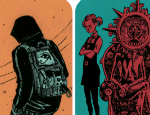Brooklyn Dreams is one of those delightful occasions in your comics-reading experience when writer and artist seem so synchronised – so completely, overwhelmingly in tune with each other – that it’s a joy for the audience to behold.
DC’s Paradox Press – and its predecessor Piranha Press – was an experiment in appealing to a non-mainstream, non-masks and costumes audience that proved to be well before its time. Beautiful Stories for Ugly Children, the Big Book of… series, Road to Perdition, A History of Violence, Stuck Rubber Baby, Why I Hate Saturn, Epicurus the Sage… the list of innovative, eclectic and boundary-pushing titles from both incarnations of the imprint challenged perceptions of what comics could be and magnificently showcased the diversity of the medium under one publishing umbrella.
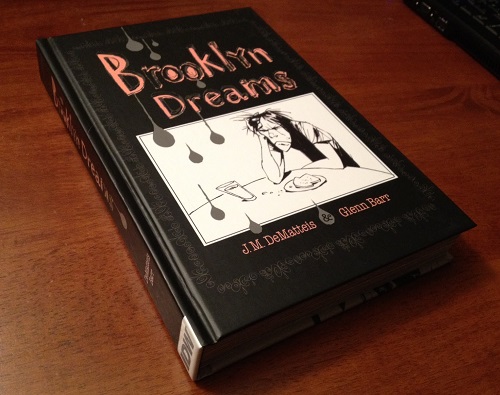
Sadly, while the “back catalogue” of both Paradox and Piranha now looks like an Indie publisher’s dream line-up, the comics-buying public did what the comics-buying public generally did at the time and, noting a tacit lack of capes, cowls and continuity, summarily ignored some absolute gems of books. The imprint fizzled out around the turn of the millennium leaving the discerning reader to wonder what could have been, but also grateful for what Paradox had achieved with its somewhat sporadic but always impressive output.
One of those most memorable books was 1994’s Brooklyn Dreams, a four-issue limited series by writer J.M. DeMatteis – at the time most known by mainstream audiences for his super-hero sitcom work on the Justice League books and his psychologically-charged Spectacular Spider-Man run – and artist Glenn Barr. Describing the book as DeMatteis’s semi-autobiographical account of growing up in Brooklyn in the 1960s and early ‘70s is superficially accurate but also woefully inadequate, because Brooklyn Dreams is so much more than a mere urban The Wonder Years. It’s about memory and our perception of it. It’s an examination of not just what we remember but how we choose to remember it. And it’s also a celebration of why embracing a flawed but vibrant interpretation of our pasts is sometimes preferable to a rigid adherence to the cold mundanity of reality.
Brooklyn Dreams is full of sliding timeframes and countless digressions as DeMatteis recounts the tale of his protagonist Vincent Carl Santini through childhood to his pivotal senior year in high school. As narrator looking back, the middle-aged Santini is portrayed with a visual realism that is abruptly curtailed when, like that seminal scene from The Wizard of Oz, he literally pulls away the curtain and we are thrown into the story of his early life.
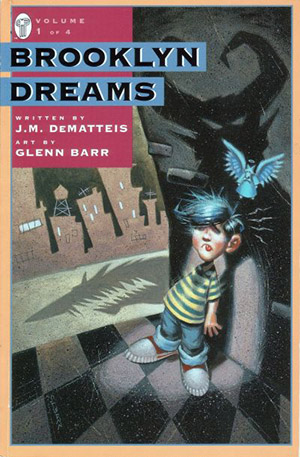
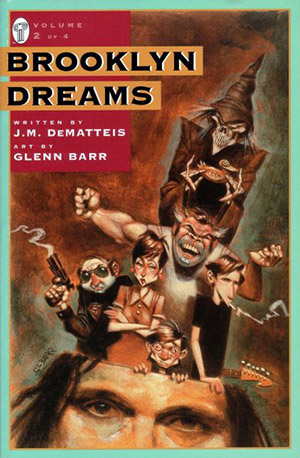
The original Paradox Press run of Brooklyn Dreams
It’s here that DeMatteis and Barr first show an almost supernatural empathy in narrative intent. Each layer of Carl’s life takes on a visual identity of its own: his childhood traumas of being chased by a dog have a storybook feel of larger-than-life monsters bearing down on the reader, his early teenage memories are slapstick and cartoony, and middle-age has a resolute, near-photographic veracity to it. It’s one of those delightful occasions in your comics-reading experience when writer and artist seem so synchronised – so completely, overwhelmingly in tune with each other – that it’s a joy for the audience to behold. Frequent forays into fantastic flights of fancy effectively punctuate the story and serve to underline Carl’s differing perceptions of the world around him, both in hindsight and from the perspective of the times in his life in which they occur.
Replete with anecdotal set pieces, Brooklyn Dreams initially introduces us to Carl’s extended family: his neurotic Jewish mother Esther, rebellious sister Phyllis, and volatile Italian father Dominick. As his world is expanded upon, we also meet a host of sometimes merely eccentric, sometimes deliberately grotesque supporting players, including monstrous aunts Minnie and Ruth, cool best friend “Shane”, the “divinely lethargic” Uncle Fred, and the doomed Bilbo, Carl’s dog-turned-figurative-guardian-angel whose presence is felt throughout the book’s four chapters. While many of these characters can be portrayed as overblown and outlandish when a particular remembrance requires them to play that part, DeMatteis and Barr are deft in their ability to turn our beliefs about them on their heads and peel back the carefully constructed dramatic facades to reveal the very human and often very fragile beings within whenever the narrative demands it.
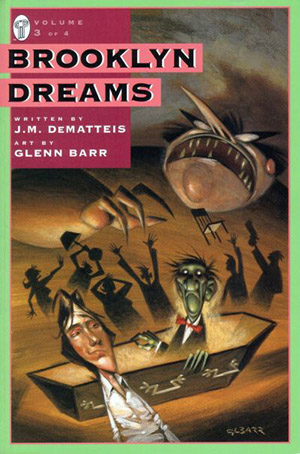
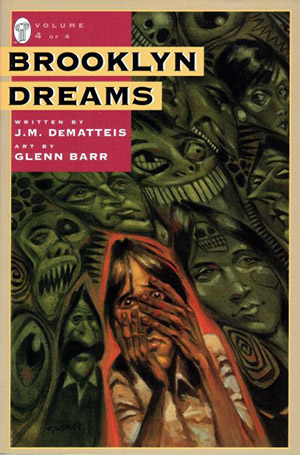
Through his interactions with this ensemble we experience the formative moments of Carl’s life as DeMatteis works his way to that crucial senior year in an endearingly rambling procession of divergences and storytelling offshoots from the main plot. It’s a sprawling, often non-linear tour through our protagonist’s history as we witness the dark last hours of Bilbo, Carl and Shane’s incompetent dabbling in the drug scene with its near farcical consequences, his first encounter with death at Uncle Fred’s semi-pantomime of a funeral, awkward fumblings with first girlfriends, and much more on the way to our ultimate destination – a culminating moment of spiritual epiphany for Carl that is brilliantly and unforgettably rendered by both creators.
One other message comes across indelibly from this darkly-humoured meditation on truth and the efficacy of memory, and I’m not sure if it’s a conscious one or whether, fittingly, it’s simply my own interpretation. There’s a sense here of commemorating the joy of a tale well told; of a raconteur revelling in the craft of his art and the artifice inherent in the game of storytelling. Brooklyn Dreams is a singular comics reading experience. An examination of the great mysteries of each individual’s life that dexterously masquerades as unstructured, meandering soap opera. In Vincent Carl Santini we have not just an everyman but several everymen, each embodying the subjective actualities of DeMatteis’s ever shifting narrative and Barr’s fluctuating illustrative compositions.
IDW’s handsome hardcover collection gives a whole new generation of readers an opportunity to enjoy this exultant masterpiece of sequential art. The slice-of-life genre has rarely been so cleverly fashioned or uniquely fabricated as it is by DeMatteis and Barr within the pages of Brooklyn Dreams.
Brooklyn Dreams is published in a black and white hardback by IDW priced $39.99.





